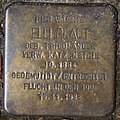Theodor Plaut (doctor)
Theodor Plaut (born September 27, 1874 in Karlsbad , † November 15, 1938 in Wuppertal ) was a German medic.
Life and activity
Plaut was the son of Rabbi Rudolf Plaut (1843–1914) and his wife Rosa, née Glans. The father had been rabbi of the Israelite community in Frankfurt am Main since 1883 .
After studying medicine in Würzburg , Munich , Berlin and Freiburg he earned his doctorate in 1897 in Munich to Dr med. In the same year he received his medical license . He then worked as an assistant in Berlin, at the Medical Clinic in Gießen and at the Cantonal Hospital in Zurich . In 1899 he settled in Frankfurt am Main as a specialist in gastric and intestinal diseases.
After participating in the First World War , which he spent as a military railroad doctor in Kovno and as a medical officer in a field hospital , Plaut was in the administration of Dr. Christ'schen Children's Hospital .
Politically, Plaut belonged to the SPD , for which he was a member of the Frankfurt city council from 1928 to 1933. He was also chairman of the Frankfurt section of the Association of Socialist Doctors .
After the National Socialists came to power , Plaut was banned from working in 1933. He then went to San Francisco as an emigrant , but returned to Frankfurt in 1935 because his seriously ill wife Meta wanted to be buried in Frankfurt am Main.
On November 15, 1938, Plaut and his second wife Elli, née Katzenstein, widowed Friedländer, whom he had married shortly before - on October 19, 1938 - committed suicide in the wake of the anti-Jewish riots in Germany known as Reichskristallnacht . Previously, Elli, who had inherited a large textile company from her husband, who died in 1930, had been expropriated because of her Jewish descent.
memory
Today a stumbling stone each reminds of Plaut and his wife who are in front of their last residence, the house at Am Forsthof 21 in Elberfeld .
Fonts
- About cerebral apoplexies and embolisms. Statistical investigations based on the cases observed in the 1st medical department of the Royal Clinical Institute in Munich in the years 1890–1894 , 1897. (Dissertation)
Journal articles (selection)
- Doctors' day in Gdansk. Volume IV (1928), Issue 3-4 (December), pp. 1-4 digitized
- German Medical Congress in Cologne 1931. Volume VII (1931), Issue 8–9 (August – September), pp. 229–232 digitized
literature
- Siegmund Drexler, Siegmund Kalinski , Hans Mausbach: Medical fate under persecution 1933–1945 in Frankfurt am Main and Offenbach , 1990, p. 41.
| personal data | |
|---|---|
| SURNAME | Plaut, Theodor |
| BRIEF DESCRIPTION | German medic |
| DATE OF BIRTH | September 27, 1874 |
| PLACE OF BIRTH | Carlsbad |
| DATE OF DEATH | November 15, 1938 |
| Place of death | Wuppertal |


